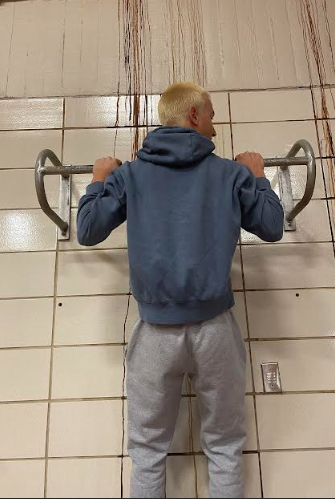Senior Stigmas
Seniors girls shed light on the stigmas they had about school, style, and relationships, how they have changed throughout the years, and their advice for underclassmen.
Lydia Crowley poses when she was a freshmen, four years ago.
In a group discussion of four Triton senior girls, all managed to recall a time in their adolescence where they deemed it necessary to achieve perfection.
“I feel like every girl has had a point in their life where they needed to be perfect,” stated Triton senior Lindsey Gardella.
Throughout the past several decades, a plethora of feats have been achieved by those of high school age. These include the Little Rock Nine putting an end to racially segregated schools in the South, Pakistani activist Malala Yousafzai winning a Nobel Peace Prize for her advocation of girls’ education, and the students of Marjory Stoneman Douglas High School actively pushing for a change in American gun laws. There are of course underlying challenges high schoolers face in their day-to-day lives that are perhaps far less daunting, and equally as unrecognized. For girls, “public appearance” can often be confused with “self worth,” or vice versa. To many Triton seniors, these terms are less likely to correlate with one another as the high school years progress. To further investigate this undercover phenomenon, the Triton Voice had the opportunity to sit down with eight senior girls to truly understand how they have changed throughout high school.
“I remember I started straightening my hair [in middle school],” chimed in Jessica Hood. “I would straighten all of my hair because one piece was wavy.”
For all eight senior girls interviewed, however, there was a dramatic shift that often naturally progressed from the beginning to the end of high school. Typically, as these girls aged, they developed more lax morning routines, higher confidence levels associated with wardrobe and makeup, and shrunken needs for social acceptance.
“Freshman year, I literally used to get up at like 5:30 to get ready and do my makeup, but now I wake up at about 7:15,” said Savannah Nolan.
“[Girls dressed] for getting attention. . .especially in seventh grade. When we all came in, I feel like people were trying to dress to impress. . .they wanted their cliquess, and [to] get all the guys,” Abby Densmore described. “Now we know each other, so it’s like, different. Everyone has already formed their cliques.”
As the Triton Voice listened to interviewees discuss this shift, a question often arose: What sparked the change?
For all interviewed, it was a similar sensation: new priorities.
“There just came a certain point, where I was like ‘If people don’t like how I look now, they won’t like how I look anyway, no matter how I dress or how I put makeup on. I’ll just do what I want to do.’ When you get ready in the morning, you do it for yourself, not for the people you’re going to be with,” said Maddie Fecteau.
“I embraced myself a lot starting my sophomore year. I embraced myself and what I did and what I wore, and I started to get a ton of feedback. If I kept wearing what I wanted to school, I would get compliments, and it was from people I didn’t know or didn’t even talk to. Being confident in yourself and what you wear and what you do gets you way more attention than doing what everyone else does,” advised Lydia Crowley.
The purpose of this article is not to bash mainstream, or otherwise “basic” style and culture. Makeup is objectively neither good nor bad; style is inherently culminated by those around you; and wanting to achieve a higher social status is simply a part of human nature. Although interviewees shed light on how a negative society may adversely affect one to wear makeup or clothes as a mask, many described style as an outlet for creativity and comfort as well.
“Sometimes it’s fun! I enjoy sitting in front of mirror for like a hour, just doing stuff with eyeshadow palettes,” cheered Gardella while Fecteau, Hood, and Tardiff agreed.
Many girls discussed how their presumptions of teachers, as well as members of the opposite sex, have both changed drastically throughout the years. Fecteau and Gardella recalled what Triton teacher Ms. Margaret Flaherty describes as “an invisible audience.”
“It’s a psychology term that means everyone is looking at you and everyone is judging you,” Flaherty explained. “I think that audience gets quieter, or [girls] learn how to quiet that, so they’re not lingering in this place of self judgement as perceived as everyone else judging you. So. . .they feel more comfortable in their own skin. I think that’s really it. . .I think that they don’t depend on it as much to present themselves to the world as they once did.”
According to the senior girls interviewed, Flaherty is not wrong.
Fecteau and Gardella remembered feeling as though they needed to present themselves perfectly to guys in years past.
“Before we would hang out with guys, we would spend hours getting ready and figuring out what we were gonna’ wear,” said Gardella.
Now, as a senior, Fecteau detailed having a different mentality.
“I don’t think [guys] care, I don’t think they ever really cared,” Fecteau said. She later described how she is now less likely to pile on makeup or nice clothes to impress others.
Additionally, Sophia Simeone described how her perception of teachers as sole authority figures has transformed from freshman to senior year, stating “As I got through junior year, I definitely saw myself connecting more with teachers. [Teachers] can definitely change your perspective on life and give you advice, because they’ve gone through it. That, and the fact that you can just have someone to confide in, it’s very important that you have [a teacher] you connect with.”
When listening to each of the eight girls’ testimonies of how each had discovered their self worth throughout high school, the Triton Voice investigated further to confirm this journey is not exclusive to Triton, and uncover what is truly behind it.
Jennifer Moss from American Positive Psychology Association shed light on the reasons she believes girls feel this way, explaining “There are a variety of reasons, many of which are correlated to hormonal changes from puberty. Girls are becoming more self-conscious and self-critical.”
“[Self critique] is a psychological stage of adolescence. It’s with you in middle school and it comes into highschool until you learn to move beyond that,” said Flaherty.
So, have Triton’s upperclassmen girls moved beyond it?
In a poll conducted by the Triton Voice where 45 girls participated, only 22.2% responded “No” to the question “Have you become more confident in yourself over the past 3 years?” Of those that answered “No,” 70% were underclassmen.
![]() Loading ...
Loading ...
There is much to say about the stigmas girls have walking into high school, and if senior girls still depend on them. When interviewed, however, many Triton girls had advice they believed was necessary for underclassmen girls to hear. Perhaps their cumulative advice is best summed up by Simeone, who simply stated “It’s less focusing about your image that’s put out to others, and more focusing about your image for yourself.”

My names Kelly Sharkey, class of 2020. What I enjoy about writing for the news is reporting about things students would be interested in reading. I play...

Hi, I’m Grace Poster, a senior at Triton Regional High School. This is my first year on Triton Voice, and so far I greatly enjoy writing about student’s...






